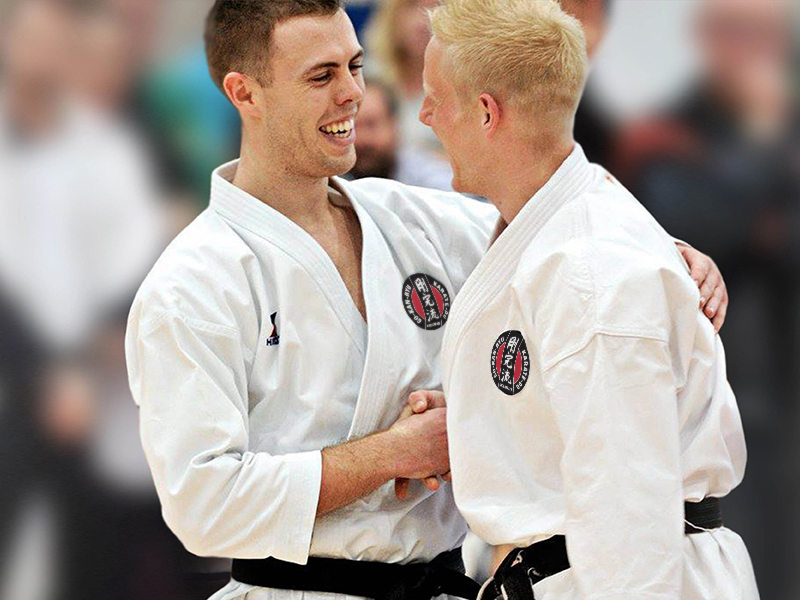The Battle Of Fatigue

Have you ever considered what it takes to achieve your goals? These could be daily goals, like cleaning the house. They could also be karate goals, like training hard or passing a Grade. Then there are scholastic goals, like studying for a test or completing paperwork. Lastly, romance goals include taking your partner out after a long day. However, what will stop you from achieving your goals is fatigue.
What is Fatigue?
Fatigue drains our enthusiasm to start or continue doing something enjoyable. It kills our concentration when we need it most, makes us irritable around the people we love most, and holds us back in our karate progress.
We’ve all trained in the dojo with that person who seemingly powers through every second of class. It’s always full steam ahead for them while we start to pace ourselves secretly. They hold their stance while we stand up, and they smash through every move in Kata. While we secretly pace ourselves midway through Bassai-dai, they dance around like jack-rabbits in kumite. We start breathing heavily and must concentrate on keeping our guard up.
We know that pacing our physical output also paces our progress, but what should we do?
Should we push ourselves?
Yes and no. One problem with fatigue is that it convinces us to collapse, but more often than not, fatigue disappears. You’re dead tired towards the end of a challenging class, your legs turn to lead, and you consider the unthinkable—asking Sensei if you can bow out. But then something happens. Despite the crisis in your muscles and your continued effort, you feel the energy returning and surge quickly through the rest of the class. What happened?
How Real Is Fatigue?
Recent research suggests that feeling fatigued is not a true indication of muscle failure but a sensation created by your nervous system to keep you from over-exercising. But that’s a good thing right? The problem is our brains often underestimate what our body is capable of and will even shut you down pre-emptive, if you let it.
For example, when going through all of the katas, midway through Bassai-dai you start to pace yourself because you feel fatigued. A year later and this is still where you start to pace yourself. You justify it by saying that it’s because you now push yourself harder, or move with more explosiveness during the earlier kata.
But it’s more likely your nervous system has a habit of sending fatigue signals out at the same time each class, despite your much-improved fitness.
What Studies Say
Exercise scientists in Cape Town first detected the brain’s tight control over performance in 2004 through an ingenious experiment in which experienced endurance athletes were asked to exercise as intensely as possible for two short bursts. In this “deception trial” they were told one burst would be for 40 seconds and the other for just 30 seconds. Obviously to the mind, 40 seconds at 100% intensity is much harder than at 30 seconds. The scientists however rigged the clock during the second test so that it moved slower.
The athlete would watch it and think 30 seconds had passed, but in actuality, it would still be 40 seconds. During the first test, the true 40 seconds, the athletes would last about 35 seconds before slowing down in exhaustion. To their minds, 35 seconds at 100% was all they had. In the second test, the athletes continued at 100% right through, showing no signs of burnout, because their minds said, “I can do 30 seconds.”
“The study showed that fatigue is often a psychological construct rather than an absolute physical condition – something that your brain creates when you start exercising, and then adjusts according to how long you train or compete,” says Alan St. Clair Gibson, associate professor at the University of Cape Town. To get the most out of your body, you must reset how your nervous system perceives fatigue.
Combating Exhaustion
The fact that fatigue is often only in your mind, means that you can choose to ignore it.
For example, when you experience a significant bout of fatigue during a class, try to put aside the typical defeatist reaction. Remove the thought or feeling of: “My muscles are failing; there’s no way I can continue at this pace.”
Instead, say to yourself in a crisp, clear voice,
“Thanks for the warning, but I’m going to relax and keep on going.”
When fatigue is treated as a normal sensation associated with exercise (rather than as a performance blockade) the person is liberated to push onward. Somewhat paradoxically, research also shows that it may be beneficial to speed up slightly when fatigue strikes. This increased neural input to your muscles gives your conservative neural governor a sharp slap in the face, and can quickly alleviate the fatigue.



